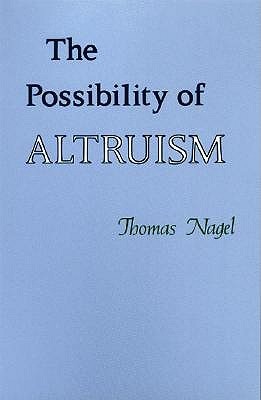
The Possibility of Altruism
Book Description
What if true altruism is not just a dream but a profound possibility? In "The Possibility of Altruism," Thomas Nagel delves into the depths of human morality, challenging the very core of self-interest. With piercing clarity, he unravels the intricate web of motivations that drive us to care for one another. It's a bold exploration of ethics that questions whether genuine selflessness can coexist with our instinctive desires. As the stakes of compassion rise, the tension between egoism and altruism takes center stage. Can we transcend our own wants to embrace a higher moral calling? This book dares to ask: is there more to humanity than just survival?
Quick Book Summary
In "The Possibility of Altruism," Thomas Nagel investigates the foundations of moral motivation, focusing on whether genuine altruism—acting for the sake of others—is philosophically possible. Nagel challenges prevailing theories that reduce all human action to self-interest and argues that there are rational grounds for actions motivated by concern for others. He explores how ethical reasoning involves transcending subjective perspectives to adopt an objective viewpoint, making altruistic concern both possible and rational. The book carefully criticizes psychological and philosophical egoism, presenting altruism as an extension of rationality itself. Nagel’s analysis defines the contours of moral obligation and addresses the tension between personal desires and impartial demands. Ultimately, Nagel makes a compelling case for altruism as an achievable aspect of human moral life.
Summary of Key Ideas
Table of Contents
The Refutation of Psychological and Philosophical Egoism
Nagel begins by examining and dismantling psychological and philosophical egoism—the view that every action is ultimately motivated by self-interest. He argues these positions fail to account for the observable reality of people acting for the sake of others. By dissecting common interpretations of motivation, Nagel lays the groundwork for understanding altruism not as an illusion, but as a central feature of moral experience. His critique reveals that the assumption of universal self-interest oversimplifies complex human behavior and underestimates the force of objective moral reasons.
The Rationality of Altruistic Motivation
Nagel contends that the rationality of altruistic motivation stems from the recognition that we are not alone in the moral universe. By adopting an objective point of view, individuals come to see the interests of others as equally valid to their own. This move toward impartiality forms the philosophical basis for altruism. Nagel demonstrates that moral reasoning requires one to transcend the subjective perspective, asserting that the ability to care for others arises naturally from rational reflection and not from hidden self-serving motives.
The Role of Objectivity in Moral Reasoning
A central theme of the book is the necessity of objectivity in ethical deliberation. Nagel argues that genuine moral judgments depend on viewing oneself as just another person among many, each with equally weighty interests. Objectivity thus serves as the bridge between recognizing personal desires and acknowledging the legitimacy of others’ needs. Nagel explores how this shift from a personal to an impersonal standpoint enables the possibility of disinterested moral concern and collective ethical responsibility.
The Nature and Limits of Moral Obligation
Nagel delves into the nature, scope, and limitations of moral obligation. He posits that being rationally bound to act in accordance with moral reasons does not require self-sacrifice in every instance but calls for the recognition of duties arising from the shared moral standpoint. This clarification helps reconcile feelings of moral strain or conflict with everyday experiences of practical decision-making. Nagel’s nuanced view establishes the boundaries of what morality can reasonably demand from agents who still have personal goals and attachments.
Reconciling Self-Interest with Morality
In the concluding analysis, Nagel explores how self-interest and morality can coexist. Rather than viewing the two as inherently opposed, he argues that a properly objective perspective enables individuals to integrate both personal and altruistic concerns. He suggests that moral maturity resides in this reconciliation: the development of a well-ordered personality that can navigate the demands of self-interest and impartial moral obligations. This integration, Nagel concludes, reveals the authentic possibility of altruism within human life.
Download This Summary
Get a free PDF of this summary instantly — no email required.





